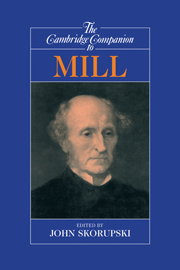Book contents
- Frontmatter
- Introduction
- 1 Mill on language and logic
- 2 Mill, mathematics, and the naturalist tradition
- 3 Mill on induction and scientific method
- 4 Mill, phenomenalism, and the self
- 5 Mill on religion
- 6 Mill on psychology and the moral sciences
- 7 Mill's utilitarianism
- 8 Mill's political economy
- 9 Civilization and culture as moral concepts
- 10 Democracy, socialism, and the working classes
- 11 The subjection of women
- 12 Mill and the Classical world
- 13 The reception and early reputation of Mill's political thought
- 14 Mill in a liberal landscape
- Guide to further reading
- Bibliography
- Index
7 - Mill's utilitarianism
Published online by Cambridge University Press: 28 May 2006
- Frontmatter
- Introduction
- 1 Mill on language and logic
- 2 Mill, mathematics, and the naturalist tradition
- 3 Mill on induction and scientific method
- 4 Mill, phenomenalism, and the self
- 5 Mill on religion
- 6 Mill on psychology and the moral sciences
- 7 Mill's utilitarianism
- 8 Mill's political economy
- 9 Civilization and culture as moral concepts
- 10 Democracy, socialism, and the working classes
- 11 The subjection of women
- 12 Mill and the Classical world
- 13 The reception and early reputation of Mill's political thought
- 14 Mill in a liberal landscape
- Guide to further reading
- Bibliography
- Index
Summary
INTRODUCTION
Mill's Utilitarianism was not written as a scholarly treatise but as a series of essays for a popular audience. It was first published in three instalments in Fraser's Magazine in 1861 and appeared in book form in 1863. Fraser's Magazine was a magazine with a general audience and the essay was written with this readership in view. Although many commentators have examined the arguments Mill puts forward in this work in isolation from his other writings, in fact it cannot be properly appreciated unless it is placed in the context of the larger body of his work. In particular, this work needs to be read against the background of his more scholarly writing in A System of Logic and in his editorial footnotes to James Mill's Analysis of the Phenomena of the Human Mind [Logic, CW VII and VIII; James Mill 1869).
John Stuart Mill is rightly considered to be a major figure in the history of utilitarianism,- his theory is a touchstone to which contemporary ethical theorists regularly return for insights. Yet at the same time, Mill's utilitarianism is boldly revisionist, breaking free of many of the constraints and confines of the narrower and simpler utilitarianism of his predecessors Jeremy Bentham and his father James Mill. Although John Stuart Mill was carefully educated and prepared by his father to be the transmitter and torch bearer of Benthamite utilitarianism, he instead radically transformed it.
- Type
- Chapter
- Information
- The Cambridge Companion to Mill , pp. 255 - 292Publisher: Cambridge University PressPrint publication year: 1998
- 22
- Cited by



